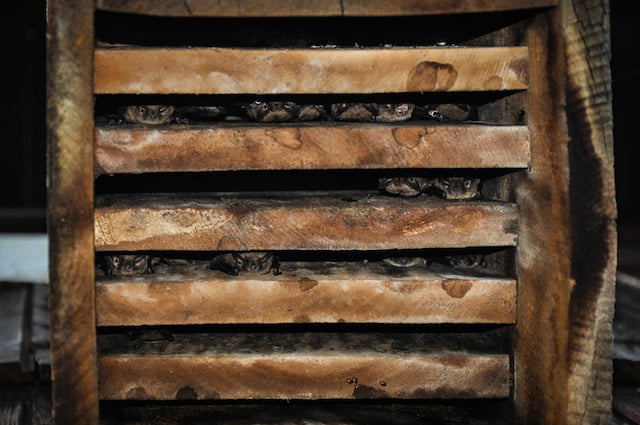
MONTPELIER, Vt. – The onset of fall sends Vermont’s bats into motion as they begin either migrating south or moving to regional underground hibernation sites for the winter.
Summer groups of bats that roost in buildings start to scatter in the fall, making it the perfect time to safely evict these uninvited guests from your attic, barn, or office building following the Vermont Fish & Wildlife Department’s Best Management Practices, available at www.vtfishandwildlife.com.
Bat houses provide an alternative location for safely evicted bats to remain in your yard and continue eating huge quantities of insects that may be forest, agricultural, or human pests. However, bat houses do require some simple maintenance. Late fall or winter is the time to look up inside your bat house and make sure all the bats have left before cleaning out any abandoned wasp nests and planning any needed caulking or repainting.
You can also help bat conservation efforts by reporting large colonies of bats living in structures to the department’s website. Locations with rare colonies of endangered little brown bats are eligible for free bat houses from Vermont Fish & Wildlife.
“Fall also means Halloween, and scary images of bats, but this presents an opportunity to bring positive attention to bats,” said Vermont Fish & Wildlife small mammals biologist Alyssa Bennett. “We are excited to participate in Bat Week, which will take place Oct. 24-31. Bat Week is an annual celebration to raise awareness about the vital ecological function of bats and to dispel many of the myths and misinformation about bats.”
Bat Week activities will include a series of virtual demonstrations and presentations to encourage people to protect bats in their own backyards and recognize the work of bat conservation worldwide. Anyone interested in learning more about Bat Week can visit www.batweek.org or email Alyssa.Bennett@vermont.gov for more information about what they can do right here in Vermont to promote bat conservation.
There are a lot of misconceptions about the connection between the Covid-19 virus and bats. “The ongoing presence of the virus causing Covid-19 continues to pose a real concern regarding the potential for reverse zoonosis,” said Bennett, “where infected humans can inadvertently transmit infectious diseases to animals. As always, we recommend keeping wildlife wild, by practicing good social distancing. If a bat needs to be captured within the living space, we ask that you wear gloves and a mask.”
Although rarely detected in bats, rabies is a deadly disease and should be taken very seriously. If you are concerned that you have been in direct contact with a bat, call the Rabies Hotline at 800-4RABIES (1-800-472-2437).
For the most accurate and up-to-date information about Covid-19 and bats, Bennett suggests visiting the Bat Conservation International website, www.batcon.org/bats-covid-19-updates.
“Bats are a very important part of our natural world and now, more than ever, they need our help,” added Bennett. “Vermont is home to several species of threatened and endangered bat species that we are working to conserve and recover, and we hope Vermonters will support these efforts and come to enjoy seeing bats in their natural environment.”